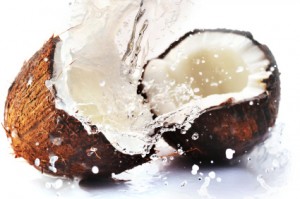Rediscovering Coconuts: A Tropical Treasure for Health

 Growing up in the vibrant tropics of Southeast Asia, coconuts were my childhood companions. I’d sip their refreshing water, nibble their sweet flesh, and smile as my mother worked warm coconut oil into my hair for that glossy shine. But my father always cautioned that coconut’s fat was bad for my health, so I kept it at arm’s length. It wasn’t until I moved to America and heard coconuts might actually be good for you—maybe even help with weight management—that I dove into research. What I found turned my father’s warnings upside down and made coconuts a staple in my kitchen.
Growing up in the vibrant tropics of Southeast Asia, coconuts were my childhood companions. I’d sip their refreshing water, nibble their sweet flesh, and smile as my mother worked warm coconut oil into my hair for that glossy shine. But my father always cautioned that coconut’s fat was bad for my health, so I kept it at arm’s length. It wasn’t until I moved to America and heard coconuts might actually be good for you—maybe even help with weight management—that I dove into research. What I found turned my father’s warnings upside down and made coconuts a staple in my kitchen.
Yes, coconuts are high in fat, like avocados and olives. While avocados and olives boast heart-friendly monounsaturated fats, coconut’s saturated fat has long been frowned upon. But here’s the twist: coconut’s fat is special. Unlike the long-chain fatty acids in meat or dairy, coconuts contain medium-chain fatty acids (MCFAs or MCTs), which your body burns quickly for energy rather than storing as fat. MCFAs can also give your metabolism a gentle nudge, making them a unique player in a balanced diet.
 Dr. Andrew Weil, a pioneer in integrative medicine, sheds light on coconut oil’s misunderstood reputation. In his writings, he notes that a tablespoon of virgin coconut oil has about 12 grams of saturated fat and 117 calories—similar to olive oil—but its MCFAs offer unique benefits, like quick energy and antimicrobial effects. “Coconut oil is fine in moderation, especially for cooking or skin care,” he says, “but for heart health, olive oil remains the gold standard.” Recent 2025 research backs this up: a Nutrition Reviews study found MCTs may support modest weight loss (1-2 pounds over weeks) when paired with a calorie-controlled diet, but they don’t lower cholesterol like unsaturated fats.
Dr. Andrew Weil, a pioneer in integrative medicine, sheds light on coconut oil’s misunderstood reputation. In his writings, he notes that a tablespoon of virgin coconut oil has about 12 grams of saturated fat and 117 calories—similar to olive oil—but its MCFAs offer unique benefits, like quick energy and antimicrobial effects. “Coconut oil is fine in moderation, especially for cooking or skin care,” he says, “but for heart health, olive oil remains the gold standard.” Recent 2025 research backs this up: a Nutrition Reviews study found MCTs may support modest weight loss (1-2 pounds over weeks) when paired with a calorie-controlled diet, but they don’t lower cholesterol like unsaturated fats.
My research also revealed coconut’s hidden powers. Coconut oil and milk contain lauric acid, which has antifungal and antibacterial properties. In Healing Spices, Dr. Bharat B. Aggarwal shares that Icelandic researchers found lauric and capric acids in coconut can kill Candida albicans, the fungus behind yeast infections. Meanwhile, Dr. Bruce Fife’s Coconut Cures explains how coconut milk boosts the absorption of vitamins A, B, D, E, and K, making your meals more nutrient-packed. Check out www.coconutresearchcenter.org for more on these benefits, updated with 2025 studies.
With this knowledge, I’ve welcomed coconuts back into my life—thoughtfully. I use virgin coconut oil (1-2 tablespoons max daily) to sauté veggies for Asian or Indonesian dishes, loving its rich flavor and high smoke point. I sprinkle toasted coconut into Indian-style rice for a nutty crunch and blend coconut milk into puddings for a creamy, satisfying treat that’s easy to digest. In my Sweet Potato and Jackfruit Pudding recipe, I cook yellow and orange cubes of sweet potato in coconut milk before adding bright yellow strips of canned jackfruit—the world’s largest tree-fruit that tastes somewhat like mango and is high in antioxidants. Then I stir in cooked Minute Tapioca to give the pudding body. It can be eaten warm or cold, as a breakfast dish or as a dessert. Now that I have started to develop a taste for coconut, I find these dishes taste delicious morning or night. For my hair and skin, a dab of coconut oil works wonders as a natural moisturizer. But I balance it with olive oil and omega-3-rich foods like salmon to keep my heart happy, as the American Heart Association advises limiting saturated fats.
Coconuts aren’t a miracle cure, but they’re far from the villain I once thought. Choose unrefined, virgin coconut oil for maximum benefits, start with a teaspoon to avoid tummy troubles, and keep portions modest. My tropical roots and modern science agree: coconuts are a delicious, versatile way to nourish body and soul. Crack one open and give it a try!
Enjoy!
Grace O

